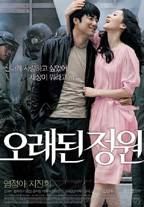

Orae-doen jeongwon
South Korea 2006
Genre:
Drama, Romance
Director:
Im Sang-soo
Cast:
Ji Jin-hee
Yum Jung-ah
Kim Yu-ri
Yun Hee-seok
Yun Yeo-Jong
Eun-Seong

The Old Garden
Story: Oh Hyun-woo (Ji Jin-hee) was a freedom fighter during the rule of general Chun's military regime, going
on the streets as part of a student movement and fighting for socialism. After the bloody massacre in Gwang-ju where
the government shot down many students, rebels are hunted down, so that Hyun-woo has to go into hiding. Luckily,
he finds shelter in the coutryside at the house of painter and art teacher Han Yoon-hee (Yum Jung-ah), who was herself
an active member of the socialistic movement at some time. Between the two a romantic relationship evolves, but just
when it is at its peak, Hyun-woo, for ideologic reasons, decides to go back to Seoul, even though his arrest is
as good as certain.
Nearly 17 years after that Hyun-woo is finally released. Meanwhile, however, his girlfriend died because of cancer
and so he indulges in reminiscences...
Review: "The Old Garden" is based on a novel by Hwang Seok-young, who lived in exile during the 80s and later
had to spend five years in prison, because he had paid a visit to North Korea without the authorization of the South-Korean
government, which is considered a criminal act. Director Im Sang-soo is someone who likes to pass criticism on the
government, too. His previous movie "The President's Last Bang" is proof enough for that. Compared to that film his
adaption of "The Old Garden" is far less sarcastic or political, though. A certain social-political tone may be running
through the whole movie, but actually the love story stands in the focus, even pushing itself to the fore one time too many.
Especially towards the end you would like to see more of the political happenings, instead of being fed with a rather
unoriginal love story.
Most likely the events in the 80s and most of all the Gwangju-massacre are still very fresh in the heads
of Koreans, so that any further explanations considering the events depicted are unnecessary. For a western audience,
that hasn't
dealt with the topic before, it will be somewhat difficult to pinpoint what the political struggle is all about and
who is fighting whom. Every now and then we get some hints or mere impressions, some of them might be quite disturbing,
and they draw a rough picture of the chaotic circumstances people had to face at that time. Unfortunately, and that's
something that needs to be mentioned even if it might seem a but out of place, some of those shocking scenes can't be
that convincing as bad CGI-effects of people set on fire simply deprive the movie of any claim to reality and make
us become aware that we are just watching a movie, which lacked money during production.
The political chaos at that time shouldn't have found its way into the general structure of the film, also, as we often
have to ask ourselves where the movie is actually heading to and if the director really knew himself where to steer
his boat to. The movie starts with Hyun-woo being released from prison. He now has to find a way to become part of
society again, so he meets some former friends, which he feels no connection to except of some old memories he shares
with them, and who are all marked by the events of their past or have to bear the emotional scars they suffered.
In some flashbacks we are introduced to Hyun-woo's past, however, the flashbacks are inserted into movie rather
confusingly. Later on, it may get better, but we still have to ask ourselves which purpose these scenes actually serve.
Sometimes the flashbacks seem to be thrown into the movie into a somewhat unmotivated manner.
Let's get to the love story, which is conveyed by Ji Jin-hee ("Perhaps Love", "Art of Revenge") and Yum Jung-ah ("A Tale of
Two Sisters", "Sad Movie"). Since this love relationship is put into the movie's center, the dirctor has to put up
with the question, why he brought this story on the screen in such an emotionally chilly way? The two actors are only
allowed to give a very reserved portrayal, at least Yum Jung-ah can score at some points, but the way it is the viewer
never gets emotionally involved or thinks of the two as an actual love couple. Therefore, the following dramatic
scenes can't really move you either, the fact that Yum died is also revealed too soon, and that the cause had to be
an illness makes things even worse. It's as if Im wanted to create some stereotype tearjerker. That just doesn't
fit into the rest of the movie, as there is still some political substance somewhere beneath all this sappy drama.
Especially towards the end Im suddenly becomes deeply absorbed in Yoon-hee's story, so that the film just becomes
a mediocre drama. Questions like those for what Hyun-woo had to spend so much time in prison, food for thought like
the dialogue in which it's stated that society is always undergoing change and that every bad era eventually gets
to an end, so that you have to preserve your will to keep on living through these harsh times, are soon forgotten. At
the end everything that remains is the bland taste of an overstretched romantic drama, of which there actually enough,
already. It would have been nice if Im Sang-soo had held onto the political theme of "The Old Garden" a bit more and
if he had filled his pictures, which are sometimes nice to look at, with some more content and more than anything else
a red thread, resp. more structure. As it is, you will have the feeling at the end that this is a missed opportunity
of a good literature adaption.

Disclaimer





















